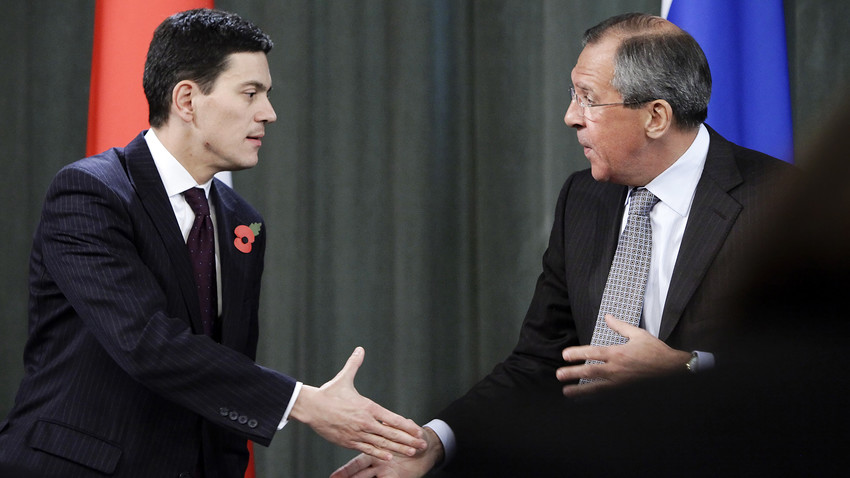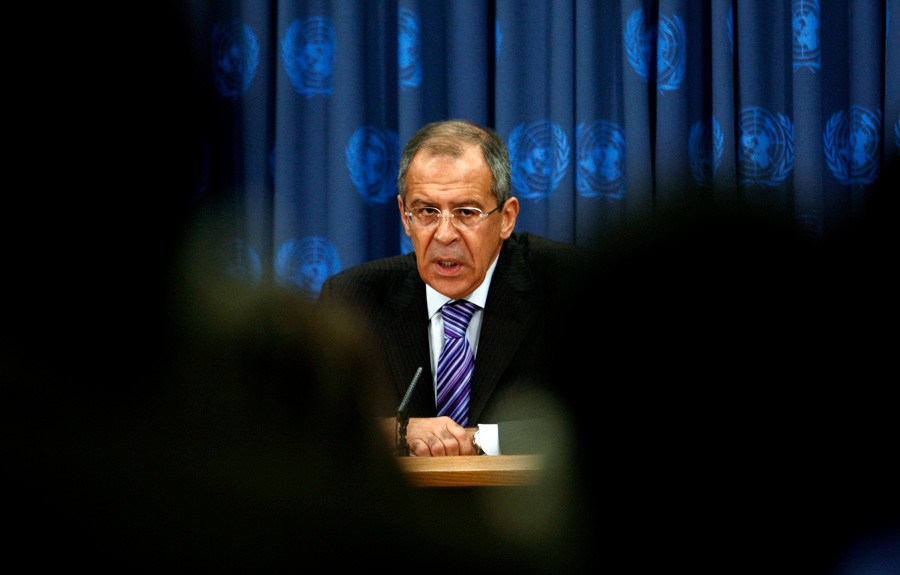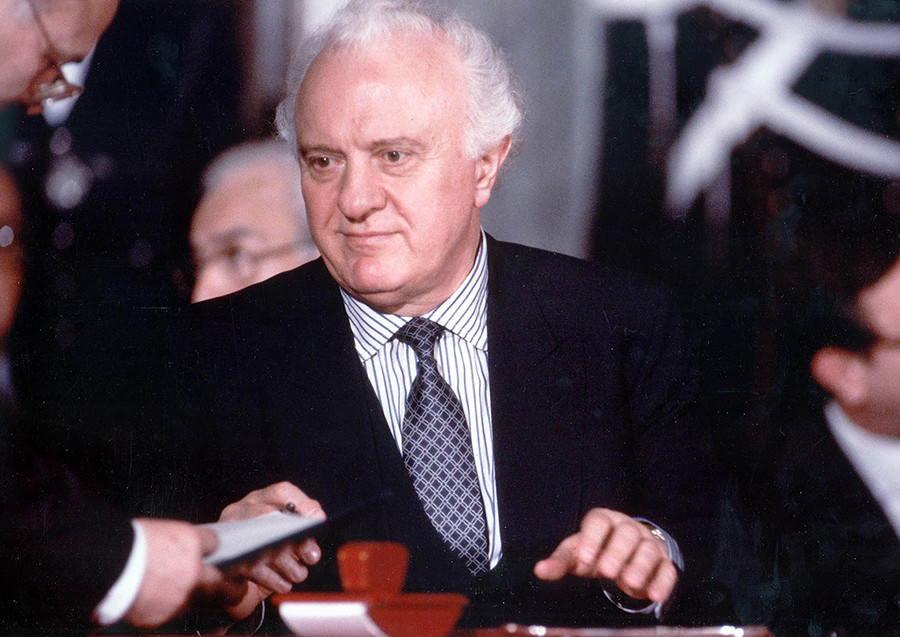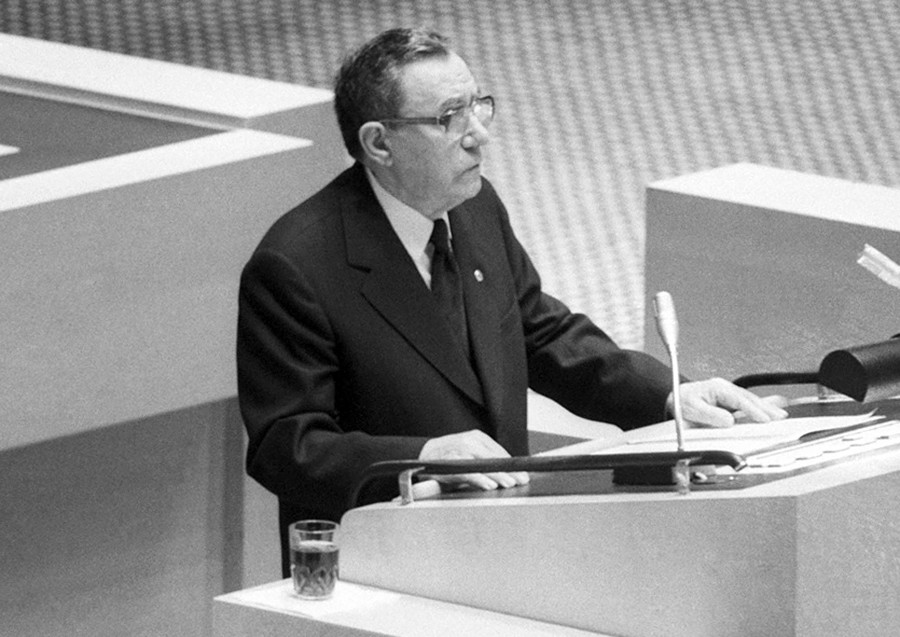
Russian Foreign Minister Sergey Lavrov, right, shakes hands his visiting Britain's counterpart David Miliband, left, during their news conference meeting in Moscow, Nov. 2, 2009
APTo a large
Russia’s current foreign minister made headlines in the aftermath of the August war between Georgia and South

Russian Foreign Minister Sergey Lavrov speaks during a news conference at United Nations in New York, September 29, 2008
ReutersIn this context, and facing intense Western pressure, Foreign Minister Sergei Lavrov spoke on the phone with his British counterpart, David Miliband. According to the Daily Telegraph’s Andrew Porter, Lavrov made “repeated use of the
Lavrov, however, denies that he addressed Miliband in such a
The Soviet Union’s last foreign minister, Eduard Shevardnadze, is on this list for signing a treaty in the summer of 1990 that defined the Bering Sea maritime boundary between the USSR and the U.S. (The two countries had been unable to agree on the issue for decades.) While neither the Soviet, nor the Russian parliament, ratified the agreement, the U.S. Congress quickly approved it. Meanwhile, over the past 27

Soviet Foreign Minister Eduard Shevardnadze signed the scandalous treaty in the summer of 1990
Fotogramma/Ropi/Zumapress/Global Look PressAccording to the agreement, the larger part of the disputed territory of 15 square nautical miles, which is important for Russian fishermen, was given to the U.S. In some areas, Washington extended its economic zone beyond the traditional 200 miles, and secured a much larger part of the continental shelf that’s believed to contain deposits of oil and gas.
“…For 20 years our [Russian] losses amounted to 4 million tons of fish, equal to $3 billion dollars. The agreement that caused such losses is referred to by Russian Far Eastern fishermen as ‘Shevardnadze’s treason,’” wrote ex-deputy Soviet fishing industry minister, Vyacheslav Zilanov, in 2017. Similar loss estimates were made in 2003 by Russia’s General Accounting Chamber.
For his defense, Shevardnadze said in 2004 that the agreement was the collective decision of the Soviet leadership. In 2002, the General Prosecutor’s Office examined the matter and concluded there was nothing wrong with Shevardnadze signing the agreement. Yet, 15 years later it still hasn’t been ratified by Moscow…
Shevardnadze’s predecessor at the Soviet foreign ministry, Andrey Gromyko, held the post for 28 years and managed to avoid public controversy, except for one occasion in 1960.
Referred to in the West as “Andrew the wolf,” “Robot-misanthrope,” and “Man without a face” for his principled stance, Gromyko once broke his stalwart demeanor when he had to support his boss during an infamous ruckus at the UN.

Andrey Gromyko held the post for 28 years
Sizov/SputnikNikita Khrushchev’s shoe-banging antics at the UN General Assembly in October 1960 are well-known. The Soviet leader was enraged by British Prime Minister Harold Macmillan’s criticism of Soviet foreign policy.
“Frankly speaking, my first thought was that Khrushchev felt sick, but in a moment I realized that our leader was protesting, trying to put Macmillan in an uncomfortable situation. I became tense and started to knock on the table – one had to support the head of the Soviet delegation. I did not look at Khrushchev, I felt uncomfortable. The situation was comical,” Gromyko later said to his son.
In his memoirs he recalled that the delegation from Spain was right in front of Khrushchev, and one of the Spanish diplomats had to lean back in order not to be accidentally hit by the Soviet leader’s shoe, and started to scream at Khrushchev: “We do not like you! We do not like you!”
Gromyko also wasn’t happy with the unexpected move, but he had no other choice but to join the Soviet leader in one of the most memorable events in UN history.
You can read more about Andrey Gromyko here.
If using any of Russia Beyond's content, partly or in full, always provide an active hyperlink to the original material.
Subscribe
to our newsletter!
Get the week's best stories straight to your inbox